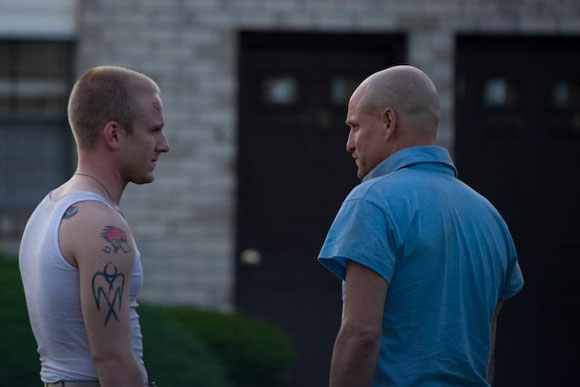The Messenger

Wounded saving his peers in the line of duty, SSgt. William Montgomery (Ben Foster) is assigned to a Casualty Notification Team, or the “Angels of Death Squadron,” as his commanding officer Captain Tony Stone (Woody Harrelson) describes it. He’s reluctantly tasked with notifying a killed soldier’s next of kin. As long as he sticks to the script, Montgomery, Stone reasons, will do fine. He cannot deviate, or inform non-relatives or, most importantly, get emotionally involved with the next of kin.
The two meet one young woman whose boyfriend was killed in action. They wait for the soldier’s mother, as required by their protocols, reluctant to share the information with the unwed mother of his child. The mother emerges, grief stricken when the news is broken. There’s a substantial amount of verbal and some physical abuse endured on the job.
“Everyone waves flags and applauds. Looks at charts and strategies, have informed opinions. And then bullets fly and soldiers die, and it’s such a shock. Fuck that. What did they think it was gonna be like? Fear Factor?” says Capt. Stone, a veteran of Operation Desert Storm.
As Dale Martin, father of Spc. Eric Martin, Steve Buscemi breaks from his mold as yet another parent who refuses to accept the reality of the situation. While his turn is a welcome one from the eccentrics and misfits to which he’s typecast, the character’s reaction is puzzling. His son’s platoon came under sniper fire, and like the woman before him he doesn’t want to hear it. Why is he angry at Montgomery, who was himself injured in duty? As the parent of a serviceman, how does he not understand the risks that came with the territory? I don’t expect every one of them to grasp it, but exploring the reasons would add depth to the character.
From the beginning the film jumps right into their roles without establishing any background beyond a sex scene between Mr. Foster and Jena Malone, who plays his sometimes girlfriend Kelly. It’s apparent that she’s with someone else, foreshadowing Montgomery’s fall for another woman.
When they visit a young widow whom Capt. Stone is convinced was cheating on her husband while he was on active duty, Sergeant Montgomery begins to crack. Though instructed to remain detached, Montgomery gets personally involved with the widow, Olivia Pitterson (Samantha Morton). Their proximity allows Sergeant Montgomery’s empathy to surface, most poignantly when he breaks protocol in a store to embrace a couple shattered by the news. Even so, we don’t learn enough about the principal characters beyond some obligatory bar confessions.
The cinematography teeters between mediocrity and creativity, with documentary-style hand-held shots reminiscent of the more candid moments in Darren Aronofsky’s The Wrestler. It’s filmed in 35mm but flat lighting, film stock and broad depth of field give the impression of inferior digital video. A reaction shot early in the film zooms in a couple beats too long, rendering the scene comical. The camera work improves considerably, however, in the second half.
It’s an ambitious subject which, handled appropriately, could be dramatically laudable. Mr. Harrelson, Mr. Buscemi and supporting actors are able and credible, but Ben Foster’s singular emotional state is amplified to compensate for a lack of acting range. This unfortunately renders the character serious when he should be relaxed, and silly when he should be serious. Without a steady tenor, Mr. Foster undermines the opportunity for catharsis toward the film’s conclusion.
 The Messenger • Dolby® Digital surround sound in select theatres • Aspect Ratio: 1.85:1 • Running Time: 105 minutes • MPAA Rating: R for language and some sexual content/nudity. • Distributed by Oscilloscope Laboratories
The Messenger • Dolby® Digital surround sound in select theatres • Aspect Ratio: 1.85:1 • Running Time: 105 minutes • MPAA Rating: R for language and some sexual content/nudity. • Distributed by Oscilloscope Laboratories